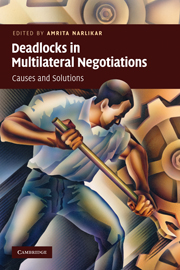Conclusion: case studies as evidence: lessons learned
Published online by Cambridge University Press: 05 June 2012
Summary
The chapters in this book address a set of hypotheses about sources of deadlocks with a variety of disciplinary and case-study analyses. The result is a rich corpus of insights about how deadlocks may occur and possible ways to exit them. The insights include both those that address the hypotheses (a form of deduction) and those that are relevant to other processes observed to operate in the cases (a form of induction). These dual products are important contributions to the literatures on multilateral negotiation and conflict settlement/resolution. They emerge from diverse settings and issue areas, take circumstances into account, and illuminate the way several hypothesised structures and processes interact: they bolster arguments for generalizability, reinforce contingency theories of conflict, and highlight synergies among the hypothesised processes. But, the approach also raises a question about whether cases provide an adequate evaluation of competing hypotheses. This issue is discussed in the following section.
Theory and case studies
This book is the most recent of a stream of negotiation studies referred to as analytical (or enhanced) case studies. The approach is based on the idea that cases can be understood through the lens of theoretical concepts or propositions. Earlier studies based on this approach have highlighted either structural/cultural or process influences on negotiation outcomes. The former connect to our Hypotheses 3, 4 and 6.
- Type
- Chapter
- Information
- Deadlocks in Multilateral NegotiationsCauses and Solutions, pp. 254 - 279Publisher: Cambridge University PressPrint publication year: 2010

